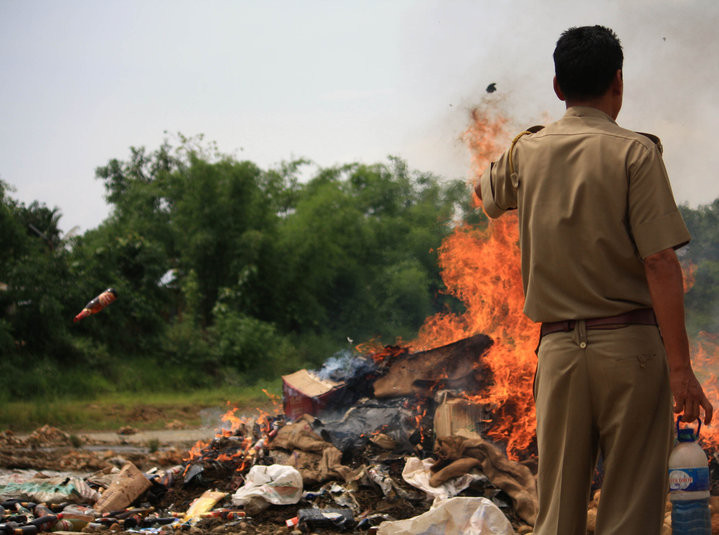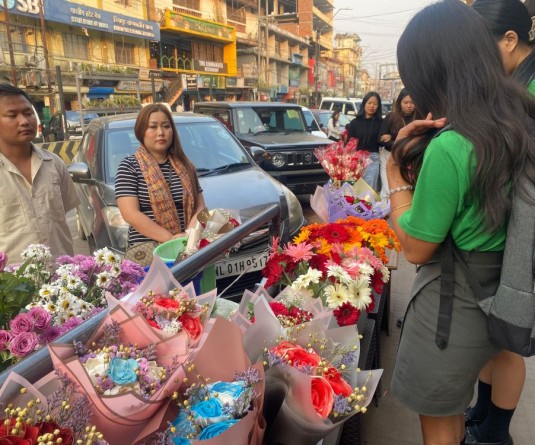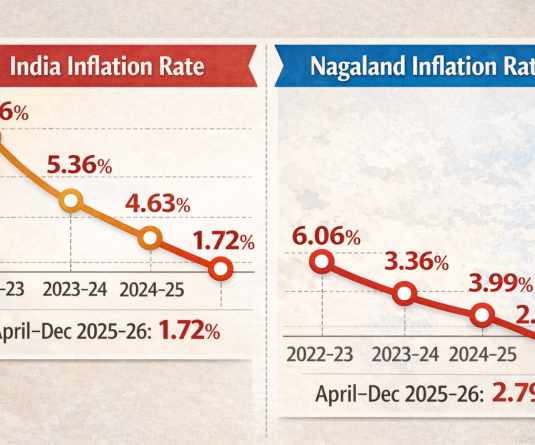An enforcement personnel watches over desutruction of seized liquor in Nagaland. (File Photo)

Big fish prospers, small fish gets caught
Atono Tsükrü Kense
Kohima | October 11
Much has been said, debated and written about the Nagaland Liquor Total Prohibition (NLTP) Act, 1989 in force for over 31 years now. The content of the Act, as published in the Nagaland Gazette Extraordinary on April 24, 1990, prohibits possession, sale, consumption, manufacture and import-export of liquor in the state of Nagaland.

It legally outlawed liquor, making Nagaland a “Dry state” but inadvertently allowed the growth of a thriving and well organised bootlegging/smuggling trade; its operators immune from the law or simply, overlooked.
“The prohibition Act is just a show and not contributing to the success. There are lots of under current and hidden issue which must be unearthed. One of them is the black marketing chain by high profile people,” a leader of the dominant Baptist church commented.
According to one citizen, not a church worker, the illicit liquor syndicate runs deep and high. Not wanting to be named, he said, “The system touches the foot soldiers to the high profile people, but we are never getting hold of the main players in this business, because they have strong connections.”
Bribes but lucrative
Speaking to The Morung Express, a highly placed source revealed that the expenses for transporting a consignment (usually a truckload) of IMFL to Kohima comes to anywhere between Rs 40-50 lakh.
It traces, not surprisingly, a trail of ‘bribe points,’ greasing the palm of state enforcement agencies to extra-constitutional entities, from the source in Assam to Kohima.
According to the source, the ‘palm greasing’ includes Rs 30,000-40,000 to the Police, around the same amount to the Excise, around Rs 30,000 to NPGs and around Rs 15,000 as ‘miscellaneous taxes/expenditures.’
It is still a lucrative business as alcohol of various brands is sold at double the price in the state brought from the neighbouring state. See box for comparative price assessment as revealed by the source.
Netting small fish
Reports of IMLF caught in transit often make it to the news. Yet there are hardly any reports of truckloads of IMFL caught. On the other hand, truckloads get transported on a daily basis.
This begs the question as to who gets caught and who does not? On this, the source said, “Apart from the ‘syndicate,’ there are small timers, who bring liquor in small quantities and dispose it in lesser price than the wholesaler syndicates,” which, he added, result in conflict of interest. As per the source, it is not uncommon for the big timers tipping the police personnel leading to the confiscation and arrest of the small timers.
He added, “The well organised syndicate has the prerogative to hike the prices of liquors at will. It usually occurs when their consignments fall prey to Assam Rifles checking and seizure.”
Big fish evades
The wholesale illicit liquor trade is said to be dominated by not more than 5-6 people or ‘barons,’ who seldom get caught.
“The liquor barons have their stocks stored in their farms located in the outskirts of the town to evade any army raids. Territorial dominance is another feature that governs the business for which these self-styled barons are spread at high profile security areas,” the source said.
In Kohima, some of the areas include Minister’s Hill, NST area, New Market, Sanuorü, Tata Parking et cetera, the source revealed, while adding that each baron has his own designated area of business.
This is the first of a three part series





